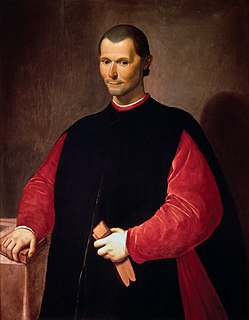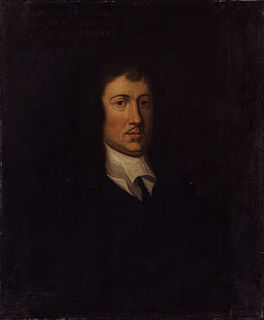Related Research Articles

Niccolò di Bernardo dei Machiavelli, occasionally rendered in English as Nicholas Machiavel, was an Italian diplomat, author, philosopher and historian who lived during the Renaissance. He is best known for his political treatise The Prince, written in about 1513 but not published until 1532. He has often been called the father of modern political philosophy and political science.

A republic is a "state in which power rests with the people or their representatives; specifically a state without a monarchy" and also a "government, or system of government, of such a state." Previously, especially in the 17th and 18th centuries, the term was used to imply a state with a democratic or representative constitution, but more recently it has also been used of autocratic or dictatorial states not ruled by a monarch. It is now chiefly used to denote any non-monarchical state headed by an elected or appointed president.
Republicanism is a political ideology centered on citizenship in a state organized as a republic. Historically, it emphasises the idea of self-rule and ranges from the rule of a representative minority or oligarchy to popular sovereignty. It has had different definitions and interpretations which vary significantly based on historical context and methodological approach.
Intellectual history is the study of the history of human thought and of intellectuals, people who conceptualize, discuss, write about, and concern themselves with ideas. The investigative premise of intellectual history is that ideas do not develop in isolation from the thinkers who conceptualize and apply those ideas; thus the intellectual historian studies ideas in two contexts: (i) as abstract propositions for critical application; and (ii) in concrete terms of culture, life, and history.

Charles Louis de Secondat, Baron de La Brède et de Montesquieu, generally referred to as simply Montesquieu, was a French judge, man of letters, historian, and political philosopher.

James Harrington was an English political theorist of classical republicanism. He is best known for his controversial publication The Commonwealth of Oceana (1656). This work was an exposition of an ideal constitution, a utopia, designed to facilitate the development of the English republic established after the regicide, the execution of Charles I in 1649.
Quentin Robert Duthie Skinner is a British intellectual historian. He is regarded as one of the founders of the Cambridge School of the history of political thought. He has won numerous prizes for his work, including the Wolfson History Prize in 1979 and the Balzan Prize in 2006. Between 1996 and 2008 he was Regius Professor of History at the University of Cambridge. He is currently the Barber Beaumont Professor of the Humanities and Co-director of The Centre for the Study of the History of Political Thought at Queen Mary University of London.

The American Enlightenment was a period of intellectual ferment in the thirteen American colonies in the 18th to 19th century, which led to the American Revolution, and the creation of the United States of America. The American Enlightenment was influenced by the 17th-century European Enlightenment and its own native American philosophy. According to James MacGregor Burns, the spirit of the American Enlightenment was to give Enlightenment ideals a practical, useful form in the life of the nation and its people.
Classical republicanism, also known as civic republicanism or civic humanism, is a form of republicanism developed in the Renaissance inspired by the governmental forms and writings of classical antiquity, especially such classical writers as Aristotle, Polybius, and Cicero. Classical republicanism is built around concepts such as civil society, civic virtue and mixed government.
John Greville Agard Pocock is a historian of political thought from New Zealand. He is especially known for his studies of republicanism in the early modern period, his work on the history of English common law, his treatment of Edward Gibbon and other Enlightenment historians, and, in historical method, for his contributions to the history of political discourse.

John Montfort Dunn, FBA is emeritus Professor of Political Theory at King's College, Cambridge, and Visiting Professor in the Graduate School of Social Sciences and Humanities at Chiba University, Japan.
A scholar of the history of British political discourse, J. G. A. Pocock, the Harry C. Black Chair of History Emeritus at Johns Hopkins University, has enjoyed over 60 years of publication. Now in his tenth decade, he recently concluded Barbarism and Religion, a six-volume study of Edward Gibbon, author of The History of the Decline and Fall of the Roman Empire. The first two volumes of B&R were awarded the American Philosophical Society's Jacques Barzun Prize in Cultural History for the year 1999.

The Machiavellian Moment is a work of intellectual history by J. G. A. Pocock. It posits a connection between republican thought in early 16th century Florence, English-Civil War Britain, and the American Revolution.
Arihiro Hoeber Fukuda was a Japanese historian who was an associate professor at the University of Tokyo Faculty of Law and specialised in the history of Western political thought, particularly the republican the ideas of James Harrington, Thomas Hobbes, David Hume, and Niccolò Machiavelli.

Virtù is a concept theorized by Niccolò Machiavelli, centered on the martial spirit and ability of a population or leader, but also encompassing a broader collection of traits necessary for maintenance of the state and "the achievement of great things."
The Cambridge Ancient History is a multi-volume work of ancient history from Prehistory to Late Antiquity, published by Cambridge University Press. The first series, consisting of 12 volumes, was planned in 1919 by Irish historian J. B. Bury and published between 1924 and 1939, co-edited by Frank Adcock and Stanley Arthur Cook. The second series was published between 1970 and 2005, consisting of 14 volumes in 19 books.
In intellectual history and the history of political thought, the Cambridge School is a loose historiographical movement traditionally associated with the University of Cambridge, where many of those associated with the school held or continue to hold academic positions, including Quentin Skinner, J. G. A. Pocock, Peter Laslett, John Dunn and James Tully, David Runciman, and Raymond Geuss.
The ancient constitution of England was a 17th-century political theory about the common law, and the antiquity of the House of Commons, used at the time in particular to oppose the royal prerogative. It was developed initially by Sir Edward Coke, in his law reports; and has been analysed in modern times by J. G. A. Pocock in The Ancient Constitution and the Feudal Law. This is not to be conflated with Bancroft-Prize-winner Mary Sarah Bilder's "transatlantic constitution."
Lois Green Schwoerer is an American historian of seventeenth century England and Elmer Louis Kayser Professor Emeritus of History at George Washington University.

The Foundations of Modern Political Thought is a two-volume work of intellectual history by Quentin Skinner, published in 1978. The work traces the conceptual origins of modern politics by investigating the history of political thought in the West at the turn of the medieval and early modern periods, from the 13th to the 16th centuries. It represents the contextualist approach to the history of ideas which Skinner and his colleagues in the Cambridge School had pioneered in the 1960s.
References
- ↑ Pocock, J. G. A. (7 January 1993). "What do we mean by it?". London Review of Books . Vol. 15, no. 1. pp. 11–12.